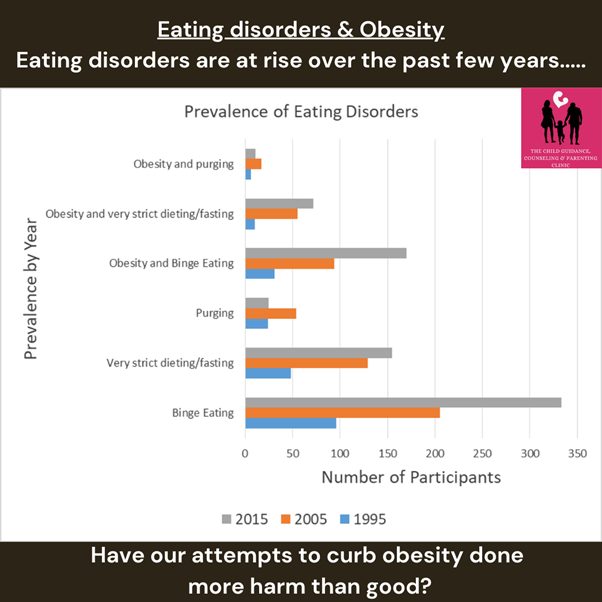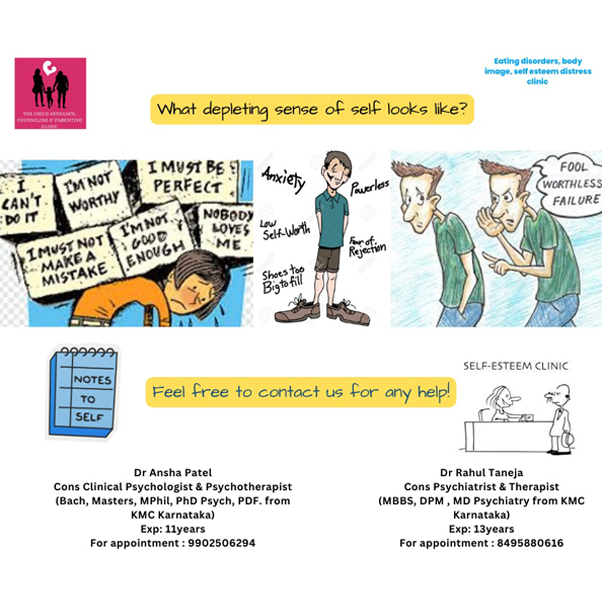Feeding and Eating Disorders Treatment in Udaipur
A child with Pediatric Feeding Disorder does not eat or drink enough food or liquid, or a broad enough range of food, to achieve and maintain growth or meet nutritional needs. The child also may not eat in age-typical ways.
Children with Pediatric Feeding Disorder may have other developmental delays. Feeding disorders can impact a child’s ability to join in social activities. This can also increase family stress and hurt the parent child relationship.
Eating disorders on the other hand are behavioral conditions characterized by severe and persistent disturbance in eating behaviors and associated distressing thoughts and emotions. They can be very serious conditions affecting physical, psychological and social function. Types of eating disorders include anorexia nervosa, bulimia nervosa, binge eating disorder, avoidant restrictive food intake disorder, other specified feeding and eating disorder, pica and rumination disorder.
At the Child guidance , Counselling and Parenting Clinic (CGC), Udaipur we treat all children for feeding and eating disorders.


Understanding Feeding Disorders
Your child may have a feeding disorder if they experience one or more of the following:
- Has trouble eating, chewing, and swallowing. This may include choking, gagging, coughing, holding food in their cheek pockets, spitting food out, mashing or sucking on food, or struggling with certain textures
- Has trouble gaining weight because they don’t eat or drink enough
- Needs supplements in order to grow
- Gets enteral feeds (e.g., NG tube, G-tube)
- Is a selective eater, extreme “picky eater.” This includes refusing to try new foods or certain types of foods and/or picky about flavors, brands, texture in a way that limits their diet
- Throws tantrums at mealtime. Has more stress at meals than non-mealtimes
- Won’t drink or eat from age-appropriate supplies. For example, a school-age child drinking from baby bottle or sippy cup.
- Has a sudden and large decrease in eating/drinking after a certain event such as choking, surgery.
What Causes Pediatric Feeding Disorder?
Most children have more than one reason that plays a role in developing a feeding disorder. Children are more likely to develop Pediatric Feeding Disorder if they have one of the following conditions:
- Autism Spectrum Disorder (ASD)
- Attention Deficit Hyperactivity Disorder (ADHD)
- Developmental delays
- Intellectual problems
- Premature birth
- Delayed oral motor skills
- Medical conditions (such as reflux, congenital heart disease, gastric issues, pulmonary disease) .

When a child isn’t growing and receiving proper nutrition, the body is not able to function normally. Serious health issues can include:
- Difficulties concentrating
- Fainting/syncope /Blackouts
- Poor wound healing
- Impaired immune response
- Abnormal lab values
- Menstrual irregularities
- Muscle weakness and body aches and tiredness
- Reduced resting metabolic rate, a result of the body’s attempts to conserve energy
How Is Pediatric Feeding Disorder Diagnosed?
Your child will be seen by doctors and health care professionals including from different specialties. They will assess your child’s feeding history, oral motor skills, nutritional status and mealtime behaviors. A Psychosocial evaluation is needed too.
How Are Pediatric Feeding Disorders Treated?
Treatments for feeding disorders at Child guidance , Counselling and Parenting Clinic (CGC), Udaipur involves medical, nutrition, feeding skills, and psychosocial experts. Based on your child’s needs treatment goals may include:
- Restoring nutritional and medical status
- Stabilizing weight gain/loss
- Increasing acceptance and variety of foods
- Creating positive mealtime experiences
- Improving oral motor skills
Eating disorders are mental health conditions that cause you to have an unhealthy relationship with food. Anyone can develop an eating disorder. Common eating disorders include anorexia nervosa, bulimia nervosa and binge-eating disorder. Treatment is available to help you feel better.
Types of eating disorders
There are several different types of eating disorders, including:
- Anorexia nervosa: Restricting food and/or caloric intake (self-starvation), fear of gaining weight and a distorted self-image.
- Bulimia nervosa: Eating large amounts of food in a short amount of time (binging) or believing that the food intake was large, followed by getting rid of the food (purging) by vomiting, using laxatives (medications that make you poop) or exercising excessively.
- Binge eating disorder: Eating or thinking that there was a large amount of food intake in a short amount of time (binging) followed by feeling shame, regret, guilt or depression.
- Pica: Compulsively swallowing non-food items (such as chalk, dirt, mud and paint).
- Rumination disorder: Undigested food returns to a person’s mouth after swallowing it. It’s then rechewed, re-swallowed or spit out.
- Avoidant/restrictive food intake disorder (ARFID): Limiting the amount or type of food eaten for reasons unrelated to a distorted self-image or an attempt to lose weight.

Signs and symptoms of eating disorders
Signs and symptoms of eating disorders vary based on the type but could include:
- Mood swings.
- Fatigue.
- Fainting or dizziness.
- Thinning hair or hair loss.
- Unexplained weight changes or drastic weight loss.
- Unusual sweating or hot flashes.
- Restrictive eating.
- Eating a lot in a short amount of time.
- Avoiding food or certain foods.
- Forced vomiting after meals or laxative misuse.
- Compulsive exercising after meals.
- Frequent bathroom breaks after eating.
- Withdrawing from friends or social activities.
- Hiding food or throwing it away.
- Food rituals (chewing food longer than necessary, eating in secret).
- Other emotional or behavioral disturbances
What does an eating disorder feel like?
If you have an eating disorder, you may feel that:
- Food is an enemy or it can harm you.
- You did something wrong or shameful after eating food.
- You aren’t at the correct weight or body size.
- You’re “failing” if you don’t meet certain weight or food requirements.
- Other people negatively perceive you.
- What and how you eat is the only thing in your life that you can control.
- You don’t want to spend time with others for fear of judgment.
Causes of feeding issues / Causes eating disorders
Research suggests there are several possible factors that lead to eating disorders, including:
- Genetics: Studies found that anorexia nervosa, bulimia nervosa and binge eating disorder run in families. You can inherit genetic traits from your biological family that make you more likely to develop the condition.
- Brain biology: Dopamine and serotonin are chemicals in your brain. They make you feel things like pleasure and happiness. Research suggests that these chemicals activate during certain eating disorder behaviors.
- Familial, Cultural and social ideals: Pressure to “fit in” can affect your mental health and change your patterns of behavior to meet certain, often unrealistic, goals set by others. In the digital era, social media, television and movies may also influence your self-esteem if you feel you don’t look like the people you follow or admire.
- Underlying mental health conditions: You may use extreme measures around food when you feel like other aspects of your life are hard to manage. An obsession with food becomes an unhealthy way of coping with painful emotions or feelings. As a result, some eating disorders happen alongside other mental health conditions.
- Experienced trauma (physical, emotional or sexual).
Complications of eating disorders.
Greatly restricting calories, vomiting (throwing up) or extreme exercise can take a toll on your physical health. An untreated eating disorder causes serious complications such as:
- Arrhythmia, heart failure and other heart problems.
- Acid reflux (gastroesophageal reflux disease or GERD).
- Gastrointestinal problems.
- Low blood pressure (hypotension).
- Organ failure and brain damage.
- Osteoporosis.
- Severe dehydration and constipation.
- Stopped menstrual cycles (amenorrhea) and infertility.
- Stroke.
- Tooth damage.
- Complications of nutritional deficiency , which can include: Anemia, impaired immune function, stunted growth, cognitive decline, bone disorders like osteoporosis, cardiovascular disease, skin problems, vision loss, neurological issues, increased susceptibility to infections, and in severe cases, even mental retardation and death, depending on the specific nutrient deficiency involved.
As a mental health condition, your feelings about food or your body image may put you at risk of suicide or thoughts of suicide.
Treatments for Eating disorders
Healthcare providers, like physicians and mental health professionals, diagnose eating disorders. Your primary care provider may review symptoms, perform a physical examination and order blood tests. A mental health counsellor, like a psychologist or psychiatrist, conducts a psychological evaluation to learn more about your eating behaviors and beliefs.
At Child guidance , Counselling and Parenting Clinic (CGC), Udaipur, we offer the following treatments for eating disorders:
- Psychotherapy: A mental health professional can determine the best type of therapy for your situation. Options include individual, group and family therapy. Many people with eating disorders choose cognitive behavioral therapy (CBT).
- Medications: You may have other conditions, like anxiety or depression, with an eating disorder. Taking antidepressants, antianxiety or other medications may improve these conditions.
- Nutrition counselling/ Allied health care : A registered dietitian with training in eating disorders can help improve eating habits and develop nutritious meal plans. This specialist can also offer tips for grocery shopping, meal planning and preparation.
The best approach is often a combination of treatment options. Your CGC , Udaipur care team will work together to create a comprehensive treatment plan to address the physical, mental and behavioral aspects of the condition.
Our posts




Testimonials
What Our Patients are Saying
“
This is great experience for me.....
These things makes us knowledge more knowledgeable how we have lifestyle and how to maintain our life in current situation's
Shilpi bharadwaj
a year ago“
This hospital is really good especially ansha mam she is really good she helped me alot. N with her support I am really doing better now
”Moksha Jain
2 years agoFurther references
Feeding disorders . Retrieved from : https://www.nationwidechildrens.org/conditions/pediatric-feeding-disorder
Eating disorders . Retrieved from : https://my.clevelandclinic.org/health/diseases/4152-eating-disorders
Book With Us Now
Get an Appointment
Support your child’s development—book your appointment today for expert guidance!
